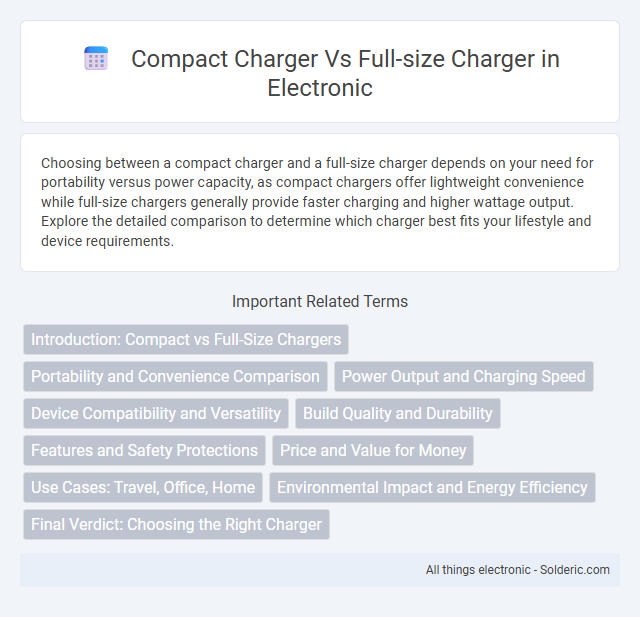Choosing between a compact charger and a full-size charger depends on your need for portability versus power capacity, as compact chargers offer lightweight convenience while full-size chargers generally provide faster charging and higher wattage output. Explore the detailed comparison to determine which charger best fits your lifestyle and device requirements.
Comparison Table
| Feature | Compact Charger | Full-Size Charger |
|---|---|---|
| Size | Small, portable, easy to carry | Larger, less portable |
| Power Output | Lower wattage (usually up to 30W) | Higher wattage (often 60W or more) |
| Charging Speed | Slower, suitable for small devices | Faster, supports charging laptops and tablets |
| Portability | Highly portable, fits in pockets or small bags | Less portable, better for home or office use |
| Price | Generally lower cost | Usually higher cost |
| Use Case | Ideal for smartphones, earbuds, small gadgets | Ideal for laptops, tablets, multiple devices |
Introduction: Compact vs Full-Size Chargers
Compact chargers offer portability and convenience for on-the-go device charging with lighter weight and smaller dimensions, ideal for travelers or minimalists. Full-size chargers provide higher power output and multiple ports, supporting faster charging and powering several devices simultaneously. Your choice depends on balancing space-saving advantages against robust performance needs.
Portability and Convenience Comparison
Compact chargers offer superior portability, making them ideal for travel and on-the-go use due to their lightweight and smaller size. Full-size chargers tend to provide faster charging speeds and more power output but can be bulky and less convenient to carry daily. Your choice depends on whether you prioritize ease of transport or charging performance.
Power Output and Charging Speed
Compact chargers typically offer lower power output, ranging from 18W to 30W, resulting in slower charging speeds compared to full-size chargers that deliver between 45W and 100W or more. Higher wattage in full-size chargers enables faster energy transfer, significantly reducing device charging time, especially for power-hungry laptops and tablets. Devices supporting fast charging protocols benefit more from full-size chargers due to their enhanced power delivery capacity, while compact chargers prioritize portability over speed.
Device Compatibility and Versatility
Compact chargers often feature limited ports and lower wattage, making them ideal for charging smartphones and small gadgets but less compatible with power-hungry devices like laptops. Full-size chargers generally offer higher wattage and multiple ports, supporting a wide range of devices including tablets, laptops, and multiple simultaneous charges. Device compatibility and versatility are significantly enhanced in full-size chargers due to their robust power delivery and diverse connector options.
Build Quality and Durability
Compact chargers often feature a sleek, lightweight design that prioritizes portability but may use thinner materials, which can impact long-term durability. Full-size chargers typically employ robust construction with high-grade components, enhancing build quality and resistance to wear and tear. For your daily use, choosing a full-size charger can ensure better durability and reliability over extended periods, especially in demanding environments.
Features and Safety Protections
Compact chargers offer portability with features like foldable plugs and lightweight design, ideal for travel and everyday carry. Full-size chargers typically include multiple USB ports, higher power output, and advanced safety protections such as overcharge, overcurrent, and temperature control to safeguard Your devices. Both types incorporate smart IC technology to optimize charging speed while preventing damage from electrical faults.
Price and Value for Money
Compact chargers often come at a lower price point, making them a budget-friendly option without sacrificing essential charging performance. Full-size chargers typically offer higher wattage and multiple ports, delivering greater value for money if you require fast charging or need to power several devices simultaneously. When considering your needs, a compact charger suits basic use and portability, whereas a full-size charger provides better long-term value through enhanced power and versatility.
Use Cases: Travel, Office, Home
Compact chargers excel in travel scenarios due to their lightweight design and portability, making them ideal for charging devices on the go. Full-size chargers offer powerful, multiple-port options better suited for office and home use where extended charging sessions and faster power delivery are often required. Your choice depends on balancing portability needs with charging capacity requirements for your specific environment.
Environmental Impact and Energy Efficiency
Compact chargers consume less raw material and generate less electronic waste, reducing their environmental footprint compared to full-size chargers. Their energy-efficient design minimizes power consumption during both active charging and standby modes, promoting sustainable energy use. Your choice of a compact charger supports eco-friendly practices by lowering overall energy demand and waste production.
Final Verdict: Choosing the Right Charger
Choosing the right charger depends on your lifestyle needs and device usage. Compact chargers offer portability and convenience for on-the-go charging, making them ideal for travel and everyday carry, while full-size chargers provide faster charging speeds and multiple ports suitable for home or office setups. Your decision should balance portability with power requirements to optimize your charging experience.
compact charger vs full-size charger Infographic

 solderic.com
solderic.com